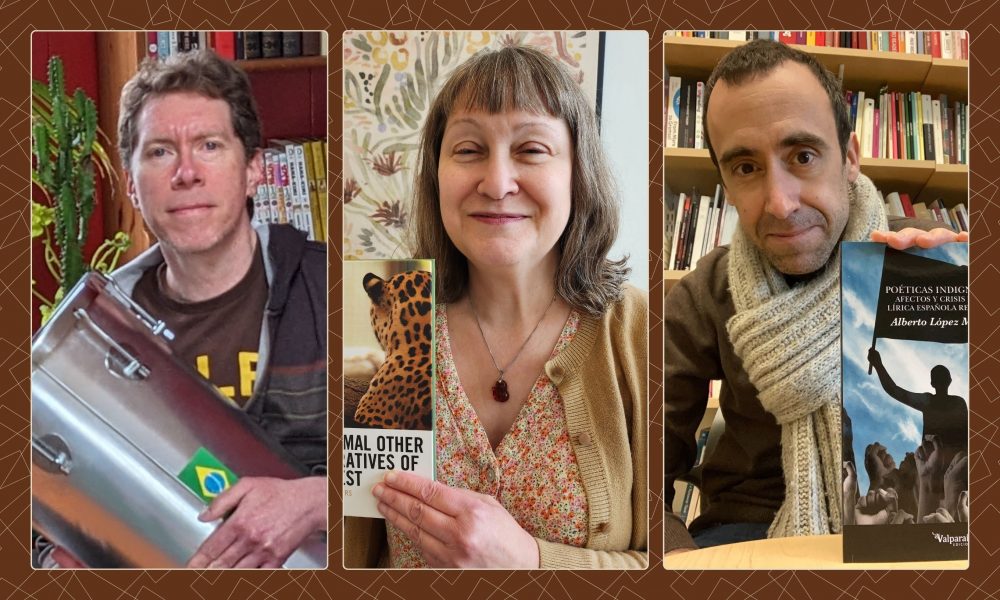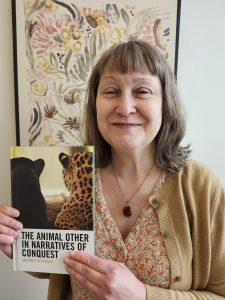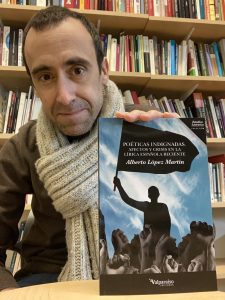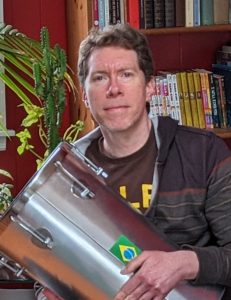
What Your ‘Profes’ Have Been Up To: Highlights from the Spanish Section
The past two years have been remarkably productive for the Spanish faculty at Valpo. In that time, three of us published books, while another received a grant to develop a fascinating project on Brazilian music. This is a rare achievement—especially at institutions like ours that emphasize teaching—and one worth celebrating. Below, we answer three questions to share more about these projects with you, our dear students.
1. What is the title of your book/project, and what is it about?
Prof. Alagna: “Makings of Music and Community: Performing Brazil in the Midwest” explores the performance of Brazilian identity in the Midwest through music and dance, and the communities that coalesce around these performances. I am focusing on the Brazilian music scenes in Madison, WI and Chicago, and plan to add Milwaukee next. The approach is multidisciplinary but anchored on performance studies, ethnomusicology, participant-observation, and interviews with performers and fans.

Prof. Stacy Hoult
Prof. Hoult: The Animal Other in Narratives of Conquest: Uncanny Encounters. It explores the functions of animal imagery in diverse narratives of the Encounter/Conquest of the Americas. I bring an eclectic approach (drawing on postcolonial and animal theories, deconstructive and Freudian literary criticisms, and radical social theory) to close readings of film, poetry, literary and popular fiction, and theme park spaces.
Prof. Miguel-Pueyo: El umbral diafano: El color en la poesía de José Martí [The Diaphanous Threshold: The Color in Jose Marti’s Poetry]. I study the complete poems of the Cuban poet in the light of color as an artistic tool that the poet uses to create the newly-born to be the Cuban nation. Marti’s poetry is considered in this book an exercise of nominalization of the nation that inserts its roots in the Cuban soil and natural environment. As a result, and in opposition to the nominal oppressor, Spain, the author achieves the goal of “creating” a new nation with his poetry.
Prof. López Martín: Poéticas indignadas. Afectos y crisis en la lírica española reciente [Outraged Poetics. Affects and Crisis in Recent Spanish Poetry]. It examines the works of poets from a wide range of aesthetic traditions within the various contexts of crisis (economic, sociopolitical, or environmental) that have unfolded in Spain over the past twenty years. From the perspectives of affect theory and ecocriticism, it explores the mobilizing potential of the poems under study.
2. What inspired you to research this topic? What is your personal connection to it?
Prof. Alagna: The inspiration came directly from my fascination with the music and the fact that I was a member of Madison’s community samba school, the Handphibians. They became an extended family. Now that I am in the Chicago area, I have found a similar community in Second City Samba. Both schools have been active for about 30 years. These cultural expressions have thrived in American society despite low levels of Brazilian immigration.
Prof. Hoult: I have always had a strong personal interest in animals and animal welfare; my books are an opportunity to connect my academic interests (Latin American literature and film; Hispanic cultures) with my passion for animal protection. I was also inspired by teaching many of the materials that appear in the book, and by my students’ reactions to these materials.

Prof. Alberto López
Prof. Miguel-Pueyo: This book is the third of a series focusing on the use of color, as a pictorial tool, connected with music as another artistic element that poets, in the long process of advancing from Romanticism(s) to the new path of literature(s) in Spanish, used to give body to their literary work. In this occasion, the book focuses on Cuban poet Jose Julian Marti’s complete poems (Ismaelillo, Versos libres, Versos sencillos), as one of the most substantial and influential in Latin American literature, as well as one whose poetry meant the creation of a new nation within his pages. Marti’s imagery finds refuge in Cuba’s nature as he himself found refuge in his poetry.
Prof. López Martín: When the Great Recession occurred, I was working as a financial advisor at a bank and witnessed firsthand the devastating effects of said crisis in Spain. I have always loved poetry, and I was pleased to discover that activists and socially committed poets turned to it to express their discontent and criticisms, creating a fascinating and combative lyrical production.
3. How have you used it, or how do you hope to use it, in your classes?

Prof. Giosuè Alagna
Prof. Alagna: I recently taught a VUE 101 class titled “Communities and Values Through Latin American Music.” Although I didn’t directly teach content related to this project as it is a work in progress, we did discuss the social significance of samba and Brazilian popular music in Brazil. We also learned about Brazilian instruments and even had a workshop where students learned and played some samba patterns on the actual instruments!
Prof. Hoult: I have referred to materials and ideas from it in many of my classes, but since it is written in English and is too specialized to use in VUE, sadly, I probably will not have the opportunity to teach the book.
Prof. Miguel-Pueyo: This book is used already at universities when studying Marti’s poetry and his unique, but not new, use of painting and musical imagery. I plan on using this analisis next time that I have the chance to explore Jose Marti’s poetry in one of my courses. I always think that poets, and writers, find inspiration in anything and everything they know, so our role as readers is one of re-construction of the imaginative universe that once fed them.

Prof. Carlos Miguel-Pueyo’s book
Prof. López Martín: We have read poems by the authors I study, such as Jorge Riechmann or Azahara Palomeque, in Spanish literature and Spanish culture and society classes, and discussed the rap lyrics of the MC and poet Gata Cattana in our Spanish in the Media class. I am deeply grateful to my students for many conversations that have helped me refine my analyses!
